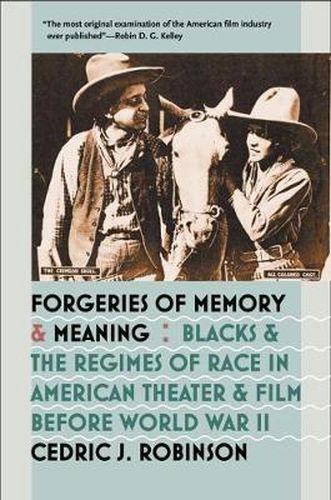Readings Newsletter
Become a Readings Member to make your shopping experience even easier.
Sign in or sign up for free!
You’re not far away from qualifying for FREE standard shipping within Australia
You’ve qualified for FREE standard shipping within Australia
The cart is loading…






Cedric J. Robinson offers a new understanding of race in America through his analysis of theater and film of the early twentieth century. He argues that economic, political, and cultural forces present in the eras of silent film and the early
talkies
firmly entrenched limited representations of African Americans. Robinson grounds his study in contexts that illuminate the parallel growth of racial beliefs and capitalism, beginning with Shakespearean England and the development of international trade. He demonstrates how the needs of American commerce determined the construction of successive racial regimes that were publicized in the theater and in motion pictures, particularly through plantation and jungle films. In addition to providing new depth and complexity to the history of black representation, Robinson examines black resistance to these practices. Whereas D. W. Griffith appropriated black minstrelsy and romanticized a national myth of origins, Robinson argues that Oscar Micheaux transcended uplift films to create explicitly political critiques of the American national myth. Robinson’s analysis marks a new way of approaching the intellectual, political, and media racism present in the beginnings of American narrative cinema.
$9.00 standard shipping within Australia
FREE standard shipping within Australia for orders over $100.00
Express & International shipping calculated at checkout
Cedric J. Robinson offers a new understanding of race in America through his analysis of theater and film of the early twentieth century. He argues that economic, political, and cultural forces present in the eras of silent film and the early
talkies
firmly entrenched limited representations of African Americans. Robinson grounds his study in contexts that illuminate the parallel growth of racial beliefs and capitalism, beginning with Shakespearean England and the development of international trade. He demonstrates how the needs of American commerce determined the construction of successive racial regimes that were publicized in the theater and in motion pictures, particularly through plantation and jungle films. In addition to providing new depth and complexity to the history of black representation, Robinson examines black resistance to these practices. Whereas D. W. Griffith appropriated black minstrelsy and romanticized a national myth of origins, Robinson argues that Oscar Micheaux transcended uplift films to create explicitly political critiques of the American national myth. Robinson’s analysis marks a new way of approaching the intellectual, political, and media racism present in the beginnings of American narrative cinema.